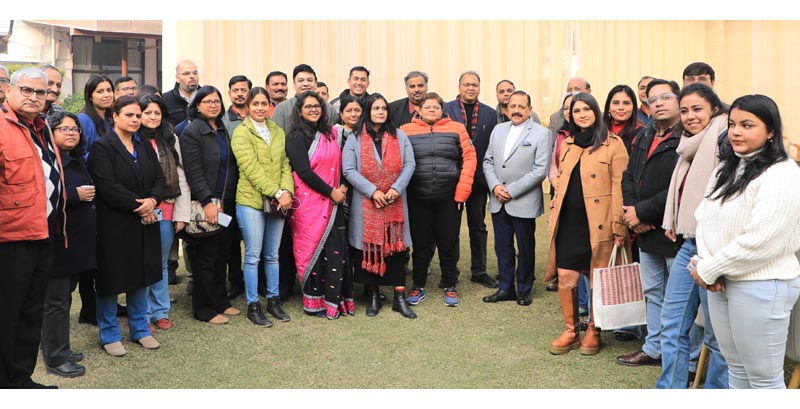Excelsior Correspondent
NEW DELHI, Jan 4: Union Minister Dr. Jitendra Singh organized an informal lunch at his residence for print and electronic journalists from various prominent publications and channels, soliciting their feedback on a variety of topics.
This gathering marks the first of its kind in the New Year, continuing a tradition Dr. Singh has maintained over the years, facilitating such media interactions at regular intervals. He believes these events foster a valuable exchange of ideas and discussions on numerous relevant issues.
During the luncheon, a lively dialogue ensued, with journalists providing their insights on various policy matters and current events. The Minister encouraged feedback on collaborative efforts that could improve governance, enhance public service delivery, and promote awareness of success stories, particularly in the field of science.
The event was characterized by constructive conversation, as the Minister directly engaged with journalists on a multitude of topics related to his Ministries. This interactive session provided opportunities for in-depth discussions regarding the Government’s initiatives, recent legislative assembly elections in J&K, and the broader developmental vision laid out by Prime Minister Narendra Modi.
Dr. Jitendra Singh expressed pride in ISRO’s Space Docking Experiment (SPADEX), describing it as a significant milestone. He shared an ambitious timeline outlining future endeavors: January 2025 will see advancements in NAVIC and a launch of a US satellite for mobile communication; in February 2025, a female robot named Vyommitra will perform astronaut-like tasks for the Gaganyaan mission; 2026 is anticipated for the first crewed Gaganyaan mission; by 2035, India aims to establish its own space station, Bharat Antariksh Station; and by 2040, the first Indian astronaut is expected to set foot on the moon.
He emphasized the essential function of the media in informing the public and shaping opinions. Regarding the Modi government’s recent reforms, Dr. Singh highlighted the introduction of the BIO-E3 (Biotechnology for Economy, Employment, and Environment) Policy, which was recently approved by the Union Cabinet under Prime Minister Modi’s oversight. This progressive policy represents a significant step for India’s biotechnology sector, enhancing its potential impact on the nation’s economy, job creation, and environmental sustainability in the future.
Journalists covering Science and Technology, Space, and Earth Sciences expressed interest in India’s Space Missions, the Deep Sea Mission, and next-generation technologies, stressing the need for a collective approach from “the whole of Science, whole of Government, and whole of Nation.” He pointed out ongoing initiatives like the Deep Sea Mission, frequently highlighted by Prime Minister Modi, and the Anusandhan National Research Foundation (NRF), which was approved in 2024 and is poised to promote innovation in 2025.


Leave a Reply